We’re nonetheless reporting. In case you are a present or former FDA worker or somebody within the trade with details about the company, the security of generic medication, or the producers that make them, our crew desires to listen to from you. Megan Rose may be reached on Sign or WhatsApp at 202-805-4865. Debbie Cenziper may be reached on Sign or WhatsApp at 301-222-3133. You too can e mail us at [email protected].
Reporting Highlights
- Dangerous Drugs: The FDA has given greater than 20 international factories a particular move to proceed sending medication to the U.S. though they had been made at crops that the company had banned.
- Troubled Factories: The drugs got here largely from crops in India the place inspectors discovered contaminated medication, filthy labs and falsified information.
- FDA Secrecy: The company didn’t proactively inform the general public when medication had been exempted from import bans, and it didn’t routinely take a look at the drugs to make sure they had been secure.
These highlights had been written by the reporters and editors who labored on this story.
On a sweltering morning in western India in 2022, three U.S. inspectors confirmed up unannounced at a large pharmaceutical plant surrounded by barricades and barbed wire and demanded to be let inside.
For 2 weeks, they scrutinized buzzing manufacturing traces and laboratories unfold throughout the dense industrial campus, peering over the shoulders of employees on the pill presses, mixers and filling machines that produce dozens of generic medication for People.
A lot of the manufacturing unit was speculated to be as sterile as an working room. However the inspectors found what gave the impression to be steel shavings on drugmaking gear, and information that confirmed vials of remedy that had been “blackish” from contamination had been despatched to the US. High quality testing in some circumstances had been postpone for greater than six months, in accordance with their report, and uncooked supplies tainted with unknown “extraneous matter” had been used anyway, blended into batches of medication.
Solar Pharma’s transgressions had been so egregious that the Meals and Drug Administration imposed one of many authorities’s harshest penalties: banning the manufacturing unit from exporting medication to the US.
However the company, nervous about remedy shortages, instantly undercut its mission to make sure the security of America’s drug provide.
A secretive group contained in the FDA gave the worldwide producer a particular move to proceed delivery greater than a dozen medication to the US though they had been made on the identical substandard manufacturing unit that the company had formally sanctioned. Capsules and injectable drugs that in any other case would have been banned went to unsuspecting sufferers throughout the nation, together with these with most cancers and epilepsy.
The FDA didn’t routinely take a look at the drugs for high quality issues or use its huge repository of drug-related complaints to proactively observe whether or not they had been harming the individuals who relied on them.
And the company stored the exemptions largely hidden from the general public and from Congress. Even others contained in the FDA had been unaware of the small print.
Within the arms of shoppers, in accordance with the FDA’s longtime head of drug security, the data would have brought on “some type of frenzy.”
“We felt we didn’t should make it a public factor,” mentioned Janet Woodcock, who spent practically 4 a long time on the company.
The exemptions for Solar weren’t a one-time concession. A ProPublica investigation discovered that over a dozen years, the identical small cadre on the FDA granted related exemptions to greater than 20 different factories that had violated important requirements in drugmaking, practically all in India. All instructed, the group allowed into the US not less than 150 drugs or their substances from factories with mildew, foul water, soiled labs or fraudulent testing protocols.
Credit score:
Obtained by ProPublica. Highlighted by ProPublica.
A number of the medication had been recalled — simply earlier than or simply after they had been exempted — due to contaminants or different defects that might trigger well being issues, authorities information present. And a ProPublica evaluation recognized greater than 600 complaints within the FDA’s information about exempted medication at three of these factories alone, every flagging considerations within the months or years after they had been excluded from import bans in 2022 and 2023.
The “antagonistic occasion” studies about medication from the Solar plant and two others run by Indian drugmaker Intas Prescribed drugs described remedy with an irregular style, odor or residue or sufferers who had skilled sudden or unexplained well being issues.
The studies cite about 70 hospitalizations and 9 deaths. And people numbers are conservative. ProPublica restricted its rely to studies that linked issues to a single drug. Nonetheless, the whole variety of complaints to the FDA that point out exempted medication is within the 1000’s.
“Belly ache … abdomen was appearing very loopy,” one report mentioned a few girl utilizing a seizure drug from Solar Pharma. The FDA acquired the grievance in 2023, 9 months after it excluded the remedy from the import ban.
“Feeling actually sizzling, breaking out with hives, arduous to breathe, had confusion, glucose degree was excessive, coronary heart price went up and head, arms and arms acquired numb,” famous one other report a few affected person taking a sedative from Intas. The grievance was despatched to the FDA in June 2023, the identical month the company exempted the remedy.
The outcomes described within the complaints could haven’t any connection to the drug or might be surprising unintended effects. In some circumstances, the FDA acquired complaints about the identical medication made by different producers.
Nonetheless, the seriousness of the studies involving exempted medication didn’t provoke the company to analyze, leaving the general public and the federal government with no approach of realizing whether or not individuals had been being harmed and, in that case, what number of.
These unknowns have completed little to gradual the exemptions. In 2022, FDA inspectors described a “cascade of failure” at one of many Intas crops, discovering employees had destroyed testing information, in a single case pouring acid on some that had been stuffed in a trash bag. On the second Intas manufacturing unit, inspectors mentioned of their report that information had been “routinely manipulated” to cowl up the presence of particulate matter — which might embrace glass, fiber or different contaminants — within the firm’s medication.
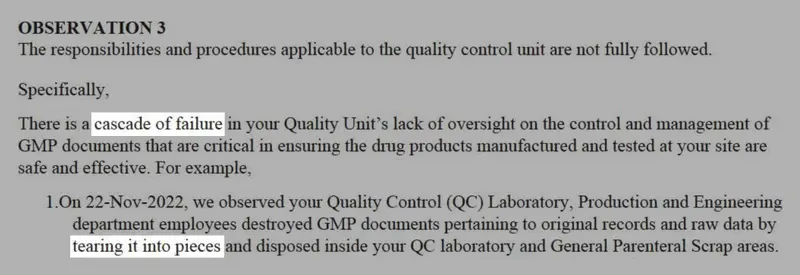
Credit score:
Obtained by ProPublica. Highlighted by ProPublica.
The FDA barred each crops in 2023 from delivery medication to the U.S. Then the company concurrently granted greater than 50 exemptions to these banned factories — the broadest use of exclusions in ProPublica’s evaluation.
Intas, whose U.S. subsidiary is Accord Healthcare, mentioned in an announcement that the corporate has invested tens of millions of {dollars} in upgrades and new hires and launched a companywide program targeted on high quality. Exempted medication had been despatched to the US in a “phased method,” the corporate mentioned, with third-party oversight and security testing. Intas additionally mentioned that some exempted medication had been by no means shipped to the US as a result of the FDA discovered different suppliers. The corporate wouldn’t present particulars.
“Intas is effectively on its approach in the direction of full remediation of all manufacturing websites,” the corporate mentioned.
Solar didn’t reply to a number of requests for remark. When the FDA imposed the ban, the corporate mentioned it might “undertake all needed steps to resolve these points and to make sure that the regulator is totally happy with the corporate’s remedial motion. Solar Pharma stays dedicated to being … compliant and in supplying high-quality merchandise to its clients and sufferers globally.”
Each corporations’ factories are nonetheless beneath import bans.
“We’re speculated to have one of the best drugs on the earth,” mentioned Joe DeMayo, a kidney transplant affected person in Philadelphia who took an immunosuppression remedy made by Intas till December 2023, unaware {that a} month earlier the FDA had excused the drug from an import ban. “Why are we shopping for from individuals who aren’t making it proper?”

Credit score:
Hannah Yoon for ProPublica
Sport of Likelihood
How the US wound up right here — enjoying a sport of probability with dangerous medication made 1000’s of miles away — is the story of an company that has relentlessly pressed to maintain the availability of low-cost generics flowing at the same time as its personal inspectors warned that a few of these medication posed a doubtlessly deadly risk to the American public.
The overwhelming majority of the prescriptions crammed within the nation are for generic medication, from penicillin to blood thinners to emergency contraception, and plenty of of these come from abroad, together with India and China. For years, the FDA has vouched for the standard of generics, assuring the general public in press releases, speeches and social media campaigns that they’re simply as secure and efficient as brand-name medication.
That assure got here beneath severe query in 2019 when journalist Katherine Eban printed a breakthrough e-book, “Bottle of Lies,” that uncovered rampant fraud and manufacturing violations in Indian factories and the FDA’s reluctance to aggressively examine.
ProPublica recognized one other alarming degree of entrenched failure: Even when the company did examine and single out factories that had been among the many worst in India, it nonetheless gave them entry to American shoppers. All of the whereas, sufferers took their drugs with out query, trusting an company that has lengthy been thought of the gold commonplace in drug regulation.
Whereas specialised enterprise publications have generally reported on exemptions after they occur, they’ve provided little context and few specifics.
The FDA in some ways put itself on this untenable place, pressured to resolve between not having sufficient medication or accepting doubtlessly harmful ones, interviews and authorities information present.
For years, the company gave corporations with a historical past of producing breakdowns approval to supply an more and more bigger share of generic medication, permitting them to develop into a dominant drive in American drugs with the ability to disrupt lives if manufacturing traces had been shuttered.
“It’s our personal fault,” mentioned former FDA inspector Peter Baker, who reported a litany of failures throughout inspections in India and China from 2012 to 2018. “We allowed all these gamers into the market who by no means ought to have been there within the first place. They grew to be monsters and now we will’t return.”
The selections to weaken penalties and permit banned factories to proceed sending medication to the US had been authorised by Woodcock, one of many company’s strongest directors. For greater than twenty years, she led the Middle for Drug Analysis and Analysis, the arm of the FDA that serves because the nation’s gatekeeper for brand spanking new and generic medication.
In a sequence of interviews with ProPublica, Woodcock mentioned she supported the usage of exemptions “as a sensible method.”
“We needed to type of take care of the hand we had been dealt,” she mentioned.

Credit score:
Jason Andrew for ProPublica
Woodcock mentioned she didn’t see a necessity to tell the general public as a result of the company believed the medication had been secure. She mentioned she talked about the observe periodically in closed-door conferences with congressional staffers, however she didn’t present specifics about these conversations.
After Woodcock left her submit in 2020 to assist lead the company’s response to the COVID-19 pandemic, the exemptions — together with these for Solar and Intas — continued beneath her successor, Patrizia Cavazzoni. Cavazzoni, who left the company earlier this yr and rejoined Pfizer, declined to remark.
Former FDA Commissioner Robert Califf, who led the company when Solar and Intas acquired exemptions, instructed ProPublica that robust calls needed to be made and the observe didn’t fear him.
The FDA didn’t reply to questions on who made these selections or how the medication had been evaluated, and it declined requests for interviews with officers who at the moment oversee drug regulation. In an e mail, the company mentioned the exemptions are “completely evaluated via a multi-disciplinary method.”
Years after the FDA began granting exemptions, some present and former officers say they wrestle with a lingering concern that unhealthy medication are circulating in the US.
“It’s not even a hypothetical,” mentioned one senior FDA worker aware of the exemptions, who, like others, spoke on the situation of anonymity as a result of they weren’t licensed to talk publicly. “It’s not a query of if — it’s a query of how a lot.”
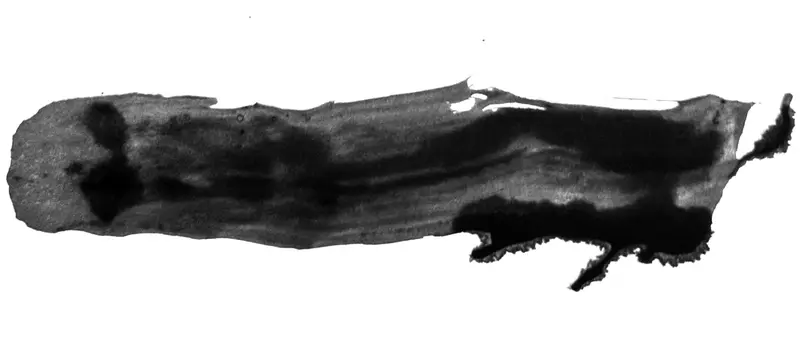
“It Was Rotten Eggs”
Though the FDA has been giving corporations a approach round import bans since not less than 2013, the inner course of was so secretive that many present and former FDA officers mentioned they don’t know what number of exemptions have been granted or for what medication. In an e mail, the company mentioned it didn’t preserve a complete listing.
Even two high-level FDA workers members who labored on drug scarcity challenges for the company mentioned in interviews that they had by no means heard of the exemptions.
Congress required the FDA in 2012 to offer particular info yearly about how and when the company relaxed its guidelines for errant drugmakers to forestall shortages. However the FDA didn’t point out exemptions to import bans till 2024 — and solely then in a single footnote of its 25-page report back to Congress.
ProPublica uncovered the frequent use of exemptions by looking for the “import alert” listing printed on the FDA’s web site that names factories banned from the U.S. market. As a result of the company publishes solely a present listing and doesn’t make the previous ones public, the information group used web archives and FDA paperwork maintained by the information analytics firm Redica Programs, finally compiling import alerts courting again greater than a decade. The lists determine the medication exempted from bans however present few different particulars.
ProPublica reviewed scores of inspection studies and company paperwork for abroad factories and interviewed greater than 200 individuals, together with present and former officers of the FDA, to grasp the little-known observe and the continuing risk posed by the company’s selections.
The investigation revealed not solely what number of medication acquired exemptions from import bans, but in addition how lengthy the FDA allowed these exemptions to remain in place — in some circumstances for years.
The company has eliminated exemptions when there is no such thing as a longer a scarcity concern. In these circumstances, the medication are then banned together with the others on the manufacturing unit. Each Solar and Intas have had medication that misplaced their exemptions.
Two and a half years after the Solar manufacturing unit was banned, 5 medication are nonetheless exempted. Intas, whose factories had been banned in 2023, at the moment has 24 medication on the listing. The bans themselves are eliminated solely after corporations repair the issues.
Earlier this month, the FDA went again to the Solar Pharma manufacturing unit for a shock inspection and located ongoing issues, in accordance with a Solar submitting with the Indian inventory alternate and Indian media studies. The considerations targeted on the best way sterile medication had been made, together with among the exempted medication nonetheless being despatched to the US, in accordance with an individual aware of the state of affairs who didn’t wish to be named as a result of they weren’t licensed to talk publicly.
The FDA mentioned it put protections in place for exempted medication: Producers are required to conduct extra high quality checks earlier than they’re despatched to the US. That has included additional drug-safety testing, in some circumstances at an impartial lab, and bringing on third-party consultants to confirm the outcomes.
The company didn’t present ProPublica with the names of the third-party consultants employed by Solar and Intas. Intas declined to call its consultants.
“The chances of those medication truly not being secure or efficient is tiny due to the safeguards,” mentioned one former FDA official concerned within the exemptions who declined to be named as a result of he nonetheless works within the trade and fears skilled retribution. “Regardless that the ability sucks, it’s getting examined extra usually and it’s having impartial eyes on it.”
However present and former FDA inspectors mentioned these security measures require trusting the vigilance of corporations that had been banned, not less than partly, for offering unreliable or misleading take a look at outcomes to the federal government or failing to analyze studies about medication with contaminants or different high quality considerations.

Credit score:
Obtained by ProPublica. Highlighted by ProPublica.
The FDA might have completed its personal routine testing of the exempted medication however selected to not. The company mentioned in an e mail that it checks the medication utilizing a “risk-based method” however wouldn’t present ProPublica with any details about which medication have been examined and what the outcomes had been.
Woodcock mentioned testing was costly and budgets had been tight. She acknowledged that frequently assessing the exempted medication for high quality or security considerations “would have enhanced our confidence … and made everybody extra comfy.”
The European Union, against this, requires medication made in India and China to be checked for high quality on EU soil. And the U.S. Division of Protection is conducting its personal testing of greater than three dozen generic drugs and has already recognized efficiency and different high quality points.
“For those who don’t know in regards to the high quality of the product, why are you letting it in?” mentioned Murray Lumpkin, the FDA’s former deputy commissioner for worldwide packages, who left the company in 2014 earlier than a lot of the exemptions had been granted.
Past the dearth of testing, the FDA didn’t actively search for patterns of hurt among the many exempted medication in its antagonistic occasion database, Woodcock and others mentioned.
ProPublica’s evaluation of that information discovered 1000’s of studies each earlier than and after the factories got a move to sidestep import bans. The studies described surprising circumstances of cardiac arrest, blurred imaginative and prescient, choking, vertigo and kidney accidents, amongst different points — and in some cases recognized particular considerations about how the medication had been made.
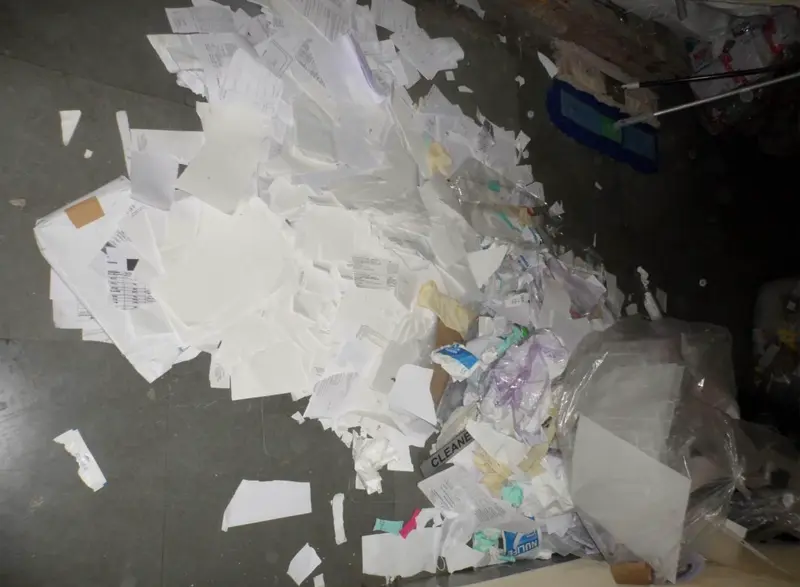
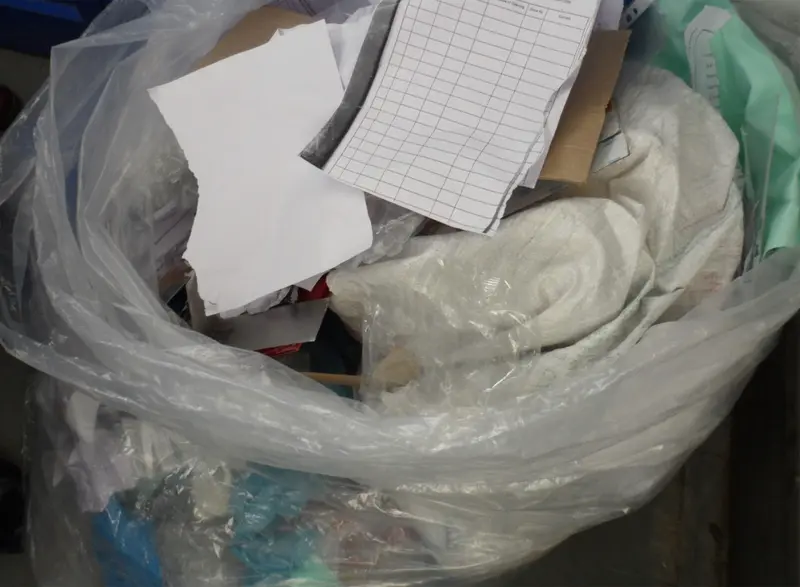
Credit score:
Obtained by ProPublica
One one that took Intas’ clonazepam, a sedative and epilepsy drug, reported getting “mind zaps” and vibrant blue enamel from the coating of dye on the drug. The FDA acquired the grievance the identical month the company exempted the drug from the import ban.
Even earlier than the FDA exempted Intas’ antidepressant bupropion, shoppers reported that it made them sick, wasn’t all the time efficient and had an irregular odor, which pharmacists and others say can occur when an inactive ingredient breaks down.
“It was rotten eggs,” Nari Miller, a geologist in California who took the drugs in 2022 and had extreme abdomen ache, instructed ProPublica. “I opened it and smelled it once I acquired residence and it was terrible.”
Intas mentioned it couldn’t reply to particular complaints and that each one medication have unintended effects. “Intas and Accord take note of each antagonistic occasion report,” the corporate mentioned, including, “Accord and Intas are dedicated to persevering with to convey secure and efficient medicines to sufferers.”
In its assertion, the FDA mentioned the database is monitored weekly for brand spanking new studies typically. Woodcock, nevertheless, acknowledged the studies about exempted medication, ideally, “can be beneath far more scrutiny.”
Too Massive to Fail
Selections made by the FDA a long time in the past gave rise to the usage of exemptions and the dangers that now confront the American public.
When new brand-name medication come to market, they’re protected by patents and unique gross sales rights that make them typically costly. When patents expire, generic drug corporations rush in to make their very own variations, that are speculated to be equal to the model. Generics are sometimes far cheaper, and insurance coverage corporations sometimes insist that sufferers use them.
Within the 2000s, as the price of brand-name medication soared, the FDA started to approve giant numbers of generics. The company, nevertheless, gave a whole bunch of these approvals to international producers that had been in hassle earlier than, corporations well-known to the inspectors working to stamp out security and high quality breakdowns at abroad factories, ProPublica discovered.
The FDA granted Solar Pharma alone greater than 250 approvals for generic medication because the late 2000s, when the corporate began amassing violations, information present. The company’s selections helped to rework the corporate from an area supplier in India to one of many main exporters of medicines to the US, with practically $2 billion in annual U.S. gross sales.
The approvals stored coming as inspectors continued to increase considerations about manufacturing practices on the firm’s factories in India, authorities information present.
Extra issues had been discovered at a manufacturing unit that Solar had acquired in Detroit, the place the diabetes drug metformin was contaminated with steel scrapings. The violations had been so important that federal marshals in 2009 raided the plant and seized medication. The corporate finally shuttered the manufacturing unit.
The fast growth of Solar and different international drugmakers set off new alarms amongst inspectors, their supervisors and advisers to Woodcock.
“In a rational system, you’d have mentioned, ‘This firm just isn’t producing correctly, so let’s not approve any extra of their medication,” mentioned William Hubbard, former FDA deputy commissioner for coverage, planning and laws. “The company in a way type of let this occur.”
Ajaz Hussain, the previous deputy director of an FDA workplace that oversaw pharmaceutical science, mentioned that after leaving the company and changing into a guide, he made his considerations identified in conferences with Woodcock and others.
“They’ll’t manufacture it. Why do you retain approving it?” Hussain recalled in an interview with ProPublica. “I mentioned, ‘Get up.’ … However they didn’t hear.”
Hussain in 2012 went to work for Wockhardt, one of many largest pharmaceutical corporations in India, however give up eight months later after he mentioned he instructed his superiors about manufacturing failures within the firm’s factories.
Though FDA inspectors had reported lapses after a number of visits to Wockhardt crops between 2004 and 2012, the company cleared the best way for the corporate to export sedatives, antibiotics, beta blockers, painkillers and different generics to the US, information present. Wockhardt acquired exemptions from import bans in 2013. The corporate didn’t reply to repeated requests for remark, however on the time, the corporate mentioned it was going to rapidly tackle the FDA’s considerations.
The FDA might have denied generic drug purposes — nothing within the regulation prohibits the company from saying no to corporations with spotty observe information. In an e mail, the FDA mentioned it considers an organization’s historical past and conducts inspections in some circumstances earlier than issuing approvals.
Woodcock mentioned the company knew which factories had been poor performers however feared being sued by corporations blocked from introducing new medication based mostly on previous habits. As an alternative, she mentioned that she tried to persuade drugmakers to put money into gear and practices that will end up higher-quality medication.
“We had many conferences about this, and we agonized about all these issues,” she mentioned.
However little modified.
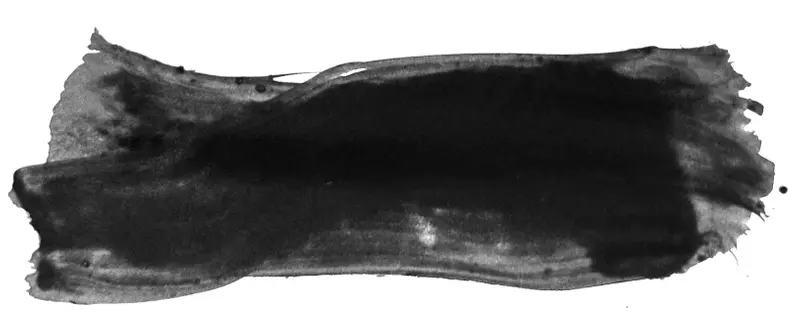
Shortages vs. High quality
In 2008, dozens of People had been killed by contaminated blood thinner from China. So when Margaret Hamburg was appointed commissioner of the FDA within the aftermath of the disaster, she pressed the company to crack down on abroad drugmakers.
Her efforts ran headlong into what would develop into the worst drug scarcity in trendy historical past. By 2010, most cancers medication had been scarce. So had been the medication on hospital crash carts. In all, greater than 200 important drugs had been in brief provide.
Razor-thin revenue margins had restricted the variety of corporations that had been prepared to make generic medication. And the FDA’s enforcement abroad had pressured some manufacturing traces to quickly shut down, which exacerbated the issue.

Credit score:
Brendan Smialowski/Bloomberg Information
Congress lambasted the FDA for the shortages and began requiring the company to show yearly the way it was combatting the issue.
On the time, the FDA had a small crew targeted on shortages that operated on the perimeters of Woodcock’s 4,000-person Middle for Drug Analysis and Analysis. With the stress on, Woodcock elevated the crew in 2010 to report on to her deputy, a transfer that gave these workers members a commanding voice on the highest ranges of the company, a number of former staffers instructed ProPublica.
After 16 years in high management roles, Woodcock was formidable sufficient to drive a tradition change. Standing 5’2” in FDA convention rooms the place she had usually been disregarded because the lone girl, Woodcock had fought for her standing — generally, she mentioned, pushed practically to tears with frustration. The board-certified internist asserted her authority by wielding information, what she known as “brute drive” and the mushy persuasion of an occasional present of an orchid, picked from her backyard in suburban Maryland.

Credit score:
Jason Andrew for ProPublica
By 2010, Woodcock had marshalled the middle right into a powerhouse with nice independence — in some ways, outdoors the attain of the political whims of the commissioners who got here and went. Those that labored along with her over time mentioned regardless of her approachable method, she fiercely guarded her territory.
Within the convention room subsequent to Woodcock’s workplace, the drug scarcity workers started to weigh in each time the FDA’s compliance crew moved to penalize wayward drugmakers due to unhealthy inspections, in accordance with a number of former FDA officers concerned within the deliberations.
Generally the small group would resolve {that a} manufacturing unit might now not ship medication to the US and would attempt to get different producers to make extra. And different instances, the group decided that exemptions from import bans had been the one course.
Discussions might be tense and infrequently lasted for weeks. A former worker on the compliance crew instructed ProPublica that they repeatedly argued to impose a complete import ban on a international manufacturing unit as a result of they feared the medication couldn’t be trusted. They had been left feeling uncomfortable about an exemption granted anyway — for a product that they might not use themselves.
With out exemptions, Woodcock instructed ProPublica, the FDA may need been pressured to supply the medication from a “completely unknown producer, say, from China or someplace.”
Present and former FDA officers mentioned the concessions grew to become a yearslong observe reasonably than a stopgap measure and that the protections put in place by the company weren’t ample. They query why Woodcock and her successor didn’t do extra to boost alarms with Congress or the general public in regards to the resolution to depend on insufficient factories for important medication.
Woodcock mentioned she thought the exemptions had been a symptom of bigger points involving the drug provide that the FDA had no management over — the company, for instance, can’t drive corporations involved about slim revenue margins to supply generic medication.
Two former FDA commissioners instructed ProPublica they knew in regards to the observe however weren’t included within the decision-making.
Hamburg, who spent six years on the company beneath the Obama administration, mentioned the extent of the observe stunned her. “Had I identified that it was kind of an open-ended coverage, I might have been disturbed,” she mentioned.
One in all her successors, Stephen Hahn, appointed throughout President Donald Trump’s first time period, mentioned extra individuals ought to have been concerned within the selections.
“You’re speaking a few drug of questionable high quality being introduced into the nation,” he mentioned.
Woodcock mentioned she didn’t consider she wanted their enter. “I didn’t suppose within the particular person circumstances it was essential to elevate,” she mentioned, “as a result of what might they do?”
“We Know What Was Discovered”
In 2020, the billionaire founding father of Solar Pharma joined a pivotal convention name with FDA compliance and investigative workers.
Dilip Shanghvi, whose father had run a wholesale drug enterprise in Kolkata, India, began the corporate within the Nineteen Eighties and finally turned Solar Pharma into one of many largest suppliers of generic medication in the US. On the decision, Shanghvi spoke about enhancements at Solar’s huge plant within the Indian metropolis of Halol, in accordance with an FDA official who attended the assembly.
Amongst different medication, the plant produced not less than 16 sterile injectables for the U.S. market, in accordance with a Solar e mail to the FDA obtained by ProPublica. Injectables are notably harmful if contaminated as a result of the remedy is injected immediately into the physique, in contrast to a capsule that goes via the filtering of the digestive tract.
In 2018 and 2019, inspectors had reported a sequence of violations on the manufacturing unit, and Solar had acquired greater than 700 complaints about what gave the impression to be crystals or spider webs forming in certainly one of its injectable drugs, information present.
The corporate additionally needed to recall greater than 135,000 vials of vecuronium bromide, a muscle relaxer used throughout surgical procedure, after studies that the remedy contained glass particles. Solar mentioned the defect might trigger life-threatening blood clots.
On the decision with the FDA, in accordance with the company official, Shanghvi assured the federal government that the Halol plant was turning out high-quality merchandise.
But, when the three investigators went again to the manufacturing unit that scorching morning in 2022 for the shock inspection, it was clear inside days that the FDA must take swift motion.
Splitting as much as test totally different components of the plant, the inspectors quizzed employees about cleansing procedures and checked out disassembled gear to see if it was contaminated with residue from previous medication. At one level, they noticed water leaking close to areas the place sterile medication had been made, an alarming commentary as a result of water can introduce contaminants able to inflicting infections and even demise.
Digging via firm information and take a look at outcomes, they discovered extra proof of high quality issues, together with how managers hadn’t correctly investigated a sequence of complaints about international materials, specks, spots and stains in tablets.

Credit score:
Obtained by ProPublica. Highlighted by ProPublica.
A number of FDA staff aware of the inspection report — 23 pages of detailed violations — mentioned that they had no concept why the company went on to exclude so lots of Solar’s medication from the next import ban.
“We all know what was discovered,” mentioned the FDA official who attended the assembly with Shanghvi. “How might you belief [those] medication?”
Solar didn’t reply to questions in regards to the remembers or its regulatory historical past with the FDA. In its 2023-24 annual report, the corporate mentioned, “We now have a relentless deal with 24×7 compliance to make sure continuity of provides to our clients and sufferers worldwide.”
The particular findings of the FDA’s newest inspection of the Solar plant performed this month haven’t but been made public, and the corporate didn’t reply to a request for remark.
To some present and former FDA officers and different consultants, plugging a provide scarcity with medication which may be contaminated or ineffective is not any resolution in any respect.
“That is perhaps serving to a scarcity however is perhaps creating a brand new drawback,” mentioned Lumpkin, the previous deputy commissioner.
Final summer season, a pair of FDA investigators arrived at one other manufacturing plant in India that had a bustling manufacturing line. After greater than every week on the Viatris manufacturing unit, they left with a well-recognized listing of security and high quality violations.
The inspectors discovered that gear wasn’t clear and managers did not completely examine unexplained discrepancies in take a look at outcomes.
In an announcement to ProPublica, Viatris mentioned it instantly labored to resolve the FDA’s considerations. “Affected person security stays our major and unwavering focus,” the corporate mentioned.
Simply earlier than Christmas, the FDA banned the ability from exporting medication.
Then the company gave the manufacturing unit a move, and 4 of its medication are nonetheless sure for the US.
Patricia Callahan and Vidya Krishnan contributed reporting, and Alice Crites contributed analysis.
Medill Investigative Lab college students Haajrah Gilani, Emma McNamee, Julian Andreone, Isabela Lisco, Aidan Johnstone, Megija Medne, Yiqing Wang, Phillip Powell, Gideon Pardo, Casey He, Lindsey Byman, Josh Sukoff, Kunjal Bastola, Shae Lake, Alyce Brown, Zhiyu Solstice Luo, Jessie Nguyen, Sinyi Au, Kate McQuarrie and Katherine Dailey contributed reporting.

